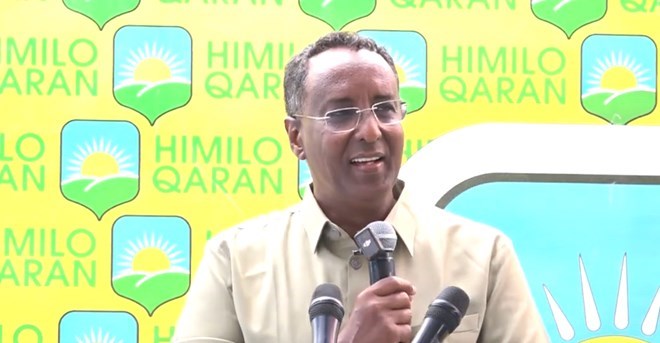Facebook Twitter (X) Instagram Somali Magazine - People's Magazine
Somali lawmaker Abdirashid Hidig has threatened to convene a parallel parliamentary session if the House of the People remains closed, accusing political leaders of deliberately obstructing legislative proceedings. His warning comes amid an escalating political crisis in Mogadishu, where opposition lawmakers claim that key officials are blocking parliament’s reopening due to fears of a no-confidence motion being introduced.
Hidig made the remarks while addressing members of the Himilo Qaran Party, emphasizing that parliament was scheduled to resume on February 6. However, procedural delays have prevented its reopening, fueling concerns about legislative paralysis. He criticized the decision to keep parliament closed, arguing that a small group of individuals cannot be allowed to hijack the democratic process. He insisted that if the chamber remains shut, lawmakers will convene elsewhere to ensure that governance functions continue.
The parliamentary standoff highlights deepening political divisions in Somalia, with opposition figures accusing Speaker Sheikh Adan Madobe of aligning with the executive branch to suppress dissenting voices. This is not the first time legislative deadlocks have disrupted governance in the country. Similar impasses have previously led to prolonged instability, exacerbating tensions between the federal government and opposition parties.
The closure of parliament also raises concerns about Somalia’s fragile political landscape, particularly with the country’s electoral process already under scrutiny. Opposition groups and regional administrations have repeatedly called for greater transparency in decision-making, fearing that political maneuvering may undermine democratic institutions. The uncertainty surrounding parliamentary sessions has intensified these concerns, with delays potentially impacting crucial governance and security discussions.
Beyond parliamentary gridlock, Hidig also condemned what he described as the misuse of Somali National Army (SNA) troops to suppress political opposition. He alleged that security forces were being deployed against government critics, particularly in the Jubaland region, where relations between the federal government and regional leaders remain strained. He warned that using military forces as a tool for political suppression could lead to further resistance, escalating tensions in already volatile areas.
Jubaland has long been a flashpoint in Somalia’s political struggles, with its leadership frequently at odds with the federal government. Allegations of military interference in regional politics only add to the existing mistrust, making reconciliation efforts even more difficult. Security analysts warn that any escalation of political disputes in Jubaland could have broader implications for Somalia’s overall stability, particularly as the government continues to battle the militant group Al-Shabaab.
The prospect of a parallel parliamentary session raises critical questions about the legal and political ramifications of such a move. If lawmakers proceed with an alternative session, it could deepen the current standoff and lead to further divisions within the government. Without a resolution, Somalia risks prolonging its political crisis at a time when security and economic challenges already pose significant threats to national stability.
As of now, there has been no official response from parliamentary leadership regarding Hidig’s ultimatum. It remains unclear whether government officials will seek a compromise to reopen parliament or allow the situation to escalate further. The coming days will be crucial in determining whether Somalia’s lawmakers can find common ground or if the political deadlock will continue to disrupt governance.
With Somalia facing multiple challenges, from security threats to economic instability, an extended legislative crisis could have severe consequences. Political analysts argue that all sides must prioritize dialogue and transparency to prevent further polarization. If the impasse remains unresolved, it could undermine confidence in the country’s political institutions and create an environment of prolonged uncertainty.
The next legislative session is expected to address key governance and security issues, making its delay all the more concerning. Lawmakers and political leaders will need to navigate this crisis carefully to ensure that Somalia’s fragile democracy does not suffer further setbacks. As opposition figures push for accountability and transparency, the government faces increasing pressure to justify its actions and facilitate the resumption of parliamentary functions.

